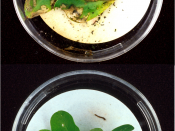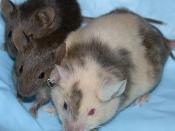Transgenic Crops and Environmental Impacts
Agriculturalists have been using genetic modification to improve their crops since ancient history. It is one of the oldest biological sciences known to man, and the science has advanced by leaps and bounds since the advent of computer technology. Not until the second half of the Twentieth Century did scientists actually discover the complete possibilities of genetic crop modification. In this essay I will explain the differences between early genetic modification and modern genetic modification and discuss the impacts of transgenic plants on the environment.
Plants have been cultivated to have certain dominant characteristics throughout history. Traditionally, farmers used cross-breeding to genetically modify their crops, but they were only able to change the aesthetics of a plant (color, size, shape, etc.). It was an exciting art form to cultivate flowers of different colors for show and sale. However, breeding was random and imprecise. Because of this, traditional genetic modification was limited in its possibilities for creation of a superior plant.
Since the 1960s scientists have been genetically modifying plants for human consumption, but these foods have been on the market since the 1990s. Geneticists are now able to unzip plant DNA and modify the genetic codes of plants, thus making it possible to both interbreed between species and combine the DNA of several different plant species to make a stronger plant. Scientists have discovered that it is possible to use this technology to cultivate plants with greater nutritional value, develop plants with an increased resistance to pesticides and herbicides, and breed plants with medicinal benefits in greater quantities while taking up less field space.
Genetic modification of crops for increased nutritional value means increased physical strength in humans, and it can even mean future generations with increased immunity to certain common ailments. Rice is being...


